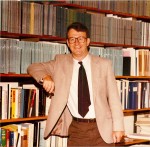Bernard M. K. Nefkens, a world-renowned experimental elementary particle physicist who worked in the UCLA Physics and Astronomy Department for nearly 50 years, died Jan. 10 after being diagnosed with a form of dementia. He was 79.
Nefkens’ research had an international impact in the areas of particle and nuclear physics . Throughout his career, he published more than 250 articles in several scientific journals, and he established research programs in institutions across the world – including France, Canada and Germany.
Nefkens received his doctorandusin physics from the University of Utrecht and his doctor of science from the University of Nijmegen in the Netherlands, where he was born.
He came to the United States when he was 25 years old and became a U.S. citizen shortly before joining UCLA’s physics and astronomy department in 1966.
Friends and students of Nefkens described him as an innovative professor who always pushed the boundaries both in and out of class.
At UCLA, Nefkens taught at multiple levels, but one of his greatest contributions to the campus was his creation of Physics 18L , said B.C. Regan , a physics professor who currently teaches the class.
“Nefkens put a lot of thoughts and design into the class. He was really into being a teacher. I saw this not only in the care, time and effort he put into the course but also in the care, time and effort that he had in teaching me to teach this course,” Regan said.
Nefkens designed Physics 18L in order to allow students to experiment in the fields of nuclear physics, which was previously unheard of at a second-year physics level.
One of his experiments in Physics 18L dealt with measuring the diameter of UCLA’s Inverted Fountain. Students were not allowed to go into the Inverted Fountain, so they experimented in various ways to accurately measure it , giving them a hands-on experience of concepts learned in the classroom.
Sriteja Upadhyayula, a UCLA alumnus, met Nefkens after applying for a research internship.
“He was a great mentor,” Upadhyayula said. “He was strict when he had to be, but gave students their room to understand and figure out the material.”
Prior to working at UCLA, Nefkens researched at the University of Illinois and Purdue University, where he met his wife of 52 years, Helen Nefkens. Though he studied physics and his wife studied Spanish, they still shared multiple interests.
“He was interested in so many different things,” Helen Nefkens said.
Bernard Nefkens enjoyed listening to music, going to concerts and operas and he loved traveling. His physics conferences allowed him and his wife to travel to various places across the world.
John Price, physics department chair at California State University, Dominguez Hills and a UCLA alumnus, met Nefkens in his winter quarter when he was his student at UCLA in 1985.
From that point on, Price built a close friendship with Nefkens and the two worked on a series of experiments together, including one in Vancouver that dealt with cool detectors.
“He was an inspiring lecturer and the way he spoke made you want to listen to him,” Price said.
One of Nefkens’ final projects in physics was the Crystal Ball experiment, which he started more than 17 years ago, but had to stop working on it because of his illness.
Prior to 1996, Nefkens acquired a well-known neutral particle detector, the Crystal Ball. Nefkens assembled an international collaboration around the detector, known as the New Crystal Ball Collaboration which consisted of institutions from all around the world.
The collaboration lasted from 1995 to2002 at the Brookhaven National Laboratory before the detector was moved to Mainz, Germany. There, Nefkens formed a new collaboration from the original Crystal Ball that still exists today.
Nefkens is survived by his wife, Helen, his three children, Julie, Karla, Chuck and his four grandchildren.
A memorial for Nefkens will be held at the UCLA Faculty Center on March 8 at 3 p.m.
